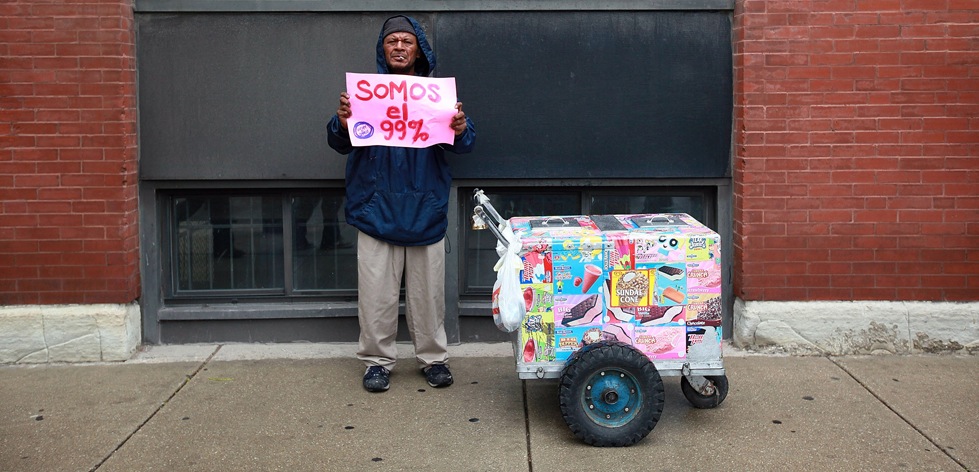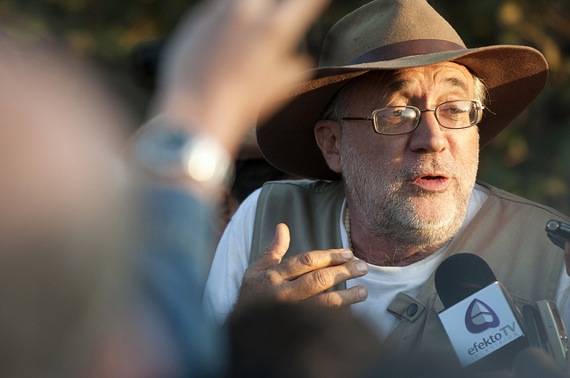
“The world is not worthy of words,” wrote the Mexican poet Javier Sicilia last spring after his son, Juanelo, was murdered by asphyxiation as yet another victim of the raging drug war. “They have been suffocated from the inside / just as they suffocated you,” Sicilia concluded. Then he put down his pen and abandoned poetry. Words themselves were too dirty, too controlled, too suppressed for him to continue writing any longer.
In his country, this repression of words is literal and brutal; Mexico’s special prosecutor reports that 81 journalists have been killed or disappeared in the country since 2006. Across Mexico’s northern border, the control of words is more subtle but no less effective — a divisive, fear-fueled stranglehold on the discourse surrounding immigration and nationalism that keeps us talking about “illegal immigrants” who are “stealing our jobs.”
But Sicilia is a writer who can never quite abandon his poetic gift, and he continues to wield the power of symbols to illuminate long-obscured connections. After leaving poetry, he founded the Movement for Peace With Justice and Dignity, which arrived in New York City last week as part of a one-month Caravan for Peace across the United States. (See earlier Waging Nonviolence reports on the trip from Mexico and Austin.) The caravan focuses on cultivating international alliances toward ending the U.S. drug war, and it has powerfully articulated the connection between the tens of thousands of murders in Mexico and the criminalization and incarceration of millions of black and brown people on both sides of the border. But like all great art, Sicilia’s journey is also bringing unexpected and silenced truths to light, including one of the most overlooked aspects of the immigration debate: why undocumented migrants are here in the first place. Even more broadly, Sicilia’s cross-country caravan challenges no less than one of the modern world’s most cherished assumptions: the sovereignty of nation states.
Sicilia’s caravan is itself a metaphor for this migration. Beginning in Tijuana, a Mexican border town that drug cartels have turned into a battlefield, the buses wove across the southern United States, stopping in cities flush with both Mexican immigrants and anti-immigration legislation: Phoenix, Houston, Montgomery, Atlanta and more. The present-day and historical causes of this migration are almost too numerous to count: The U.S. drug war has led to nearly 100,000 people murdered or disappeared in Mexico since 2006; U.S. corporations and their “free-trade” agreements have looted the Mexican economy; the U.S. dependence on cheap seasonal agricultural workers encourages men to cross the border; and, meanwhile, the U.S. has spent decades practicing direct but clandestine interference in Mexican politics.
For those who have been forced to cross the border because the border crossed them, the international analysis of migration is so natural that they have adopted it like a second (or third) language. Juan Carlos Ruiz, a Mexican-born minister in Brooklyn, wrote in the second issue of the Occupy movement magazine Tidal:
The saying that is common among many of us who have been ousted is, “we are here because you are there” — “there” meaning our homelands from which we have been forced out under the banner of democracy and development.

But among the U.S.-born participants in the immigration debate, few of these factors are rarely, if ever, discussed. This narrow, U.S.-centric framework has plagued even the Occupy movement, threatening to throw the definition of “the 99 percent” into crisis. Last Friday, on the steps of City Hall in New York, Sicilia declared in Spanish:
In the center, paradoxically, of the global culture of financial barbarity, the Occupy movement and the 99 percent appeared: ‘We are the 99 percent’ they have not stopped crying, and by crying it they do not only refer to the 99 percent of those marginalized in the United States, but in the entire world.
Shortly after Sicilia spoke, however, another Occupy-involved struggle for undocumented restaurant workers came under fire in online OWS forums. “Deport the illegal workers and give the jobs to workers that are here legally,” wrote one Occupier who disapproved of the movement involving itself in a struggle not poised to improve U.S.-born Americans.
This comes as a reminder that the Occupy movement as a whole has not adequately confronted the question of whether it is a domestic movement to resurrect economic fortunes of people living in the United States, or part of a global solidarity movement to challenge oppression internationally. Much of the early rhetoric and the inspiration from the Arab Spring would point to the latter. But many of Occupy’s preoccupations a year later suggest the former: Americans’ imprisonment in debt; the corruption of money in U.S. politics; environmental degradation in the U.S., especially from fracking and the proposed Keystone XL pipeline; the practices of police departments; and the domestic housing crisis. These are all important campaigns. Yet each emphasizes, whether implicitly or explicitly, the rights of Americans without adequately challenging whether a solely American movement can embrace and struggle with those who fall outside the state’s definition of its citizenry.
The power of the caravan rests on a different framework, one that challenges our understanding of international borders in an era when transnational corporations are increasingly overshadowing the primacy of nation states. As the Caravan for Peace demonstrates, the neat ideals of national sovereignty are rife with contradictions. Sometimes a nation has sovereignty, such as its right to define and enforce citizenship laws. Other times, like when one country declares a war on drugs that gives rise to violence and death in another country, it doesn’t. Some things — such as money, corporations, corporate-sponsored culture and trade agreements — are free to trapeze across borders. Other things, such as people, are not. A moral crisis arises when the contradictions of sovereignty collide.
Citing the example of the U.S.-Mexico drug war directly, professor Seyla Benhabib wrote in The New York Times that a country’s immigration law must consider and integrate “associative obligations among peoples arising through historical factors.” She’s talking about solidarity, which the Occupy movement has both professed and struggled with as it wrestles to establish its own borders. It’s also a debate that has, for the most part, evaporated.
Yet there it was, standing on the sweltering steps of City Hall last Friday: a man-turned-symbol for the violence enacted by hypocritical borders — a Ya Basta! cry for not only an end to the violence but also for an honest conversation about the true meaning of solidarity, one that would once again make the world worthy of words. As the one-year anniversary of Occupy Wall Street on September 17 approaches, it’s now up to the movement to prove it was listening.

This is so extraordinary, thank you, Laura. At least in my experience, Occupy had a huge impact on how I think about immigration. Beforehand, I was much more stuck in thinking in the terms of nation states and borders and law-and-order reforms, and frustrated with my inability to come to a framework that seemed consistent with justice. But through the clarifying, anarchic experience of OWS — and not necessarily through anybody talking about immigration directly — the wrongness of the fact that money can cross borders but people cannot became clear and convincing in a way that shifted my whole approach to the issue — or liberated it. That was even before immigrant justice groups started showing up at meetings and articulating their experience. I think, therefore, that there’s something about the Occupy spirit that is deeply resonant with the kind of thinking that you so beautifully demonstrate here. But I also agree with you that there has been far too little said or done to ensure that the movement takes a clearer stand in solidarity with migrants and those who have borne the brunt of U.S. neocolonialism.
Nathan, bless you for your open mind. What many fail to recognize or want to deny is that Latinos, whether US citizens or otherwise, carry Native American blood in their veins. That makes them closer to natives than most people, and that blood/connection to indigenous status should be respected. This nation didn’t originate in New England, although my own ancestors arrived there in the late 15th century, and the natives didn’t deport us although we had no papers nor permission to enter. Further, if recent DNA evidence is any indication, Asians were here before anybody, and I’ve always believed that our American Natives were somehow kin to ancient Asians. We are ALL anchor babies except the natives and Latinos, that in ALL the Americas, not just the USA
Thanks for this! I would hate to think, though, that it requires blood ties to be compassionate about other people.
Thank you for this. I would encourage all of us to raise our voices and break out of the “divisive, fear-fueled stranglehold on the discourse surrounding immigration and nationalism that keeps us talking about “illegal immigrants” who are “stealing our jobs.””
This discourse is not spontaneous. It is the product of many years of diligent organizing on the part of NGOs — and they have done very good organizing, though I disagree strongly with their opinions. More about this network can be found at the Southern Poverty Law Center’s website; search for “Tanton.”
Raise your voices! Even if it’s to say a quiet “I don’t agree.” It does make a difference.
Ir’a clearly time to end our invasive, murderous, unconstitutional wars abroad, bring our troops home and garrison them on both borders.